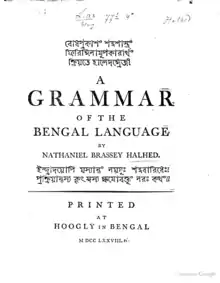Panchanan Karmakar
Panchanan Karmakar (Mallick) (died c. 1804) was an Indian Bengali inventor, born in Jirat, Bengal Presidency, British India, hailed from Serampore. He assisted Charles Wilkins in creating the first the Bangla type.[1] His wooden Bengali alphabet and typeface had been used until Ishwar Chandra Vidyasagar proposed a simplified version.[2] Apart from Bangla, Karmakar developed type in 14 languages, including Arabic, Persian, Marathi, Telugu, Burmese and Chinese.[1] His predecessors lived in Jirat, afterwards they shifted to Tribeni in 1778.
Panchanan Karmakar | |
|---|---|
পঞ্চানন কর্মকার | |
| Born | |
| Died | 1804 |
Early life and career

Karmakar was born in Tribeni village in Hooghly district. His ancestors were calligraphers; they inscribed names and decorations on copper plates, weapons, metal pots, etc.[1] panchanan himself was a wordsmith at tribani.
Andrews, a Christian missionary, had a printing press at Hughli. In order to print Nathaniel Brassey Halhed's A Grammar of the Bengal Language, he needed a Bangla type.[1] Under the supervision of English typographer Charles Wilkins, Karmakar[3] created the first Bengali typeface for printing.[4]
In 1779, Karmakar moved to Kolkata to work for Wilkins' new printing press.[1] in chuchura, Hoggly .In 1801, he developed a typeface for British missionary William Carey's Bangla translation of the New Testament.[5] In 1803, Karmakar developed a set of Devnagari script, the first Nagari type to be developed in India.[1]
References
- Islam, Sirajul (2012). "Panchanan Karmakar". In Islam, Sirajul; Hossain, Ayub (eds.). Banglapedia: National Encyclopedia of Bangladesh (Second ed.). Asiatic Society of Bangladesh.
- Ghulam Morshed. "Vidyasagar, Pundit Iswar Chandra". Banglapedia. Retrieved March 20, 2016.
- Greenspan, Ezra; Rose, Jonathan (September 2003). Book History - Ezra Greenspan, Jonathan Rose. ISBN 0271023309. Retrieved 2015-06-02.
- Works [ed. by E.R. Rost]. - Horace Hayman Wilson -. 1865. p. 273. Retrieved 2015-06-02 – via Internet Archive.
charles wilkins.
- TNN (February 9, 2012). "Flower power resurrects Carey legacy". The Times of India. Retrieved March 20, 2016.